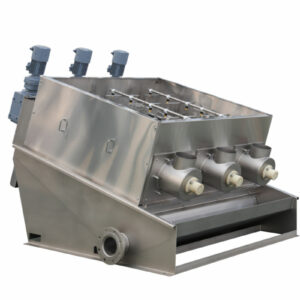Yes, screw press machines can be used for composting applications. Composting is a process of breaking down organic materials, such as food waste, yard waste, and other biodegradable materials, into a nutrient-rich soil amendment that can be used for gardening and agriculture.
Screw press machines can be used in the composting process to remove excess water from the compost, which can help to speed up the decomposition process and reduce odors. The dewatered compost can then be further processed into a dry, granular form that is easier to handle and transport.
In addition to dewatering, screw press machines can also be used to mix and homogenize the composting materials, which can improve the efficiency and effectiveness of the composting process. Some screw press machines are equipped with mixing blades or paddles that can be used to blend the materials together and ensure that they are evenly distributed.
Screw press machines can be a cost-effective and efficient way to manage organic waste and produce high-quality compost. However, it’s important to select a machine that is appropriate for the specific composting application and to follow proper composting procedures to ensure that the compost is safe and effective for use.
What are some factors to consider when selecting a screw press machine for composting?
When selecting a screw press machine for composting, there are several factors to consider to ensure that the machine is effective and efficient for the specific application. Here are some factors to consider:
Capacity: The capacity of the screw press machine should be appropriate for the amount of organic waste that needs to be processed. It’s important to select a machine that can handle the required volume of waste without causing delays or backups in the composting process.
Material handling requirements: The screw press machine should be able to handle the specific type of organic waste that is being processed, screw press machine supplier including its moisture content, particle size, and other characteristics. For example, some machines may be better suited for processing wet or fibrous materials, while others may be better suited for dry or powdery materials.
Operating conditions: The screw press machine should be able to operate effectively under the specific environmental and operating conditions of the composting facility. This includes factors such as temperature, humidity, and noise levels.
Maintenance requirements: The screw press machine should be easy to maintain and repair, with readily available replacement parts. It should also be easy to clean and sanitize to prevent contamination of the composting materials.
Cost: The cost of the screw press machine should be assessed in relation to its features and capabilities. It’s important to select a machine that offers the required functionality at a reasonable cost, while also taking into account long-term operating and maintenance costs.
Safety and compliance: The screw press machine should meet all necessary safety and compliance standards for the specific application and jurisdiction, including electrical safety, noise levels, and emissions standards.
By considering these factors, it’s possible to select a screw press machine that is well-suited for the specific composting application, and that can help to improve the efficiency and effectiveness of the composting process.
